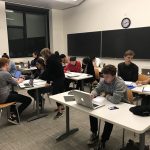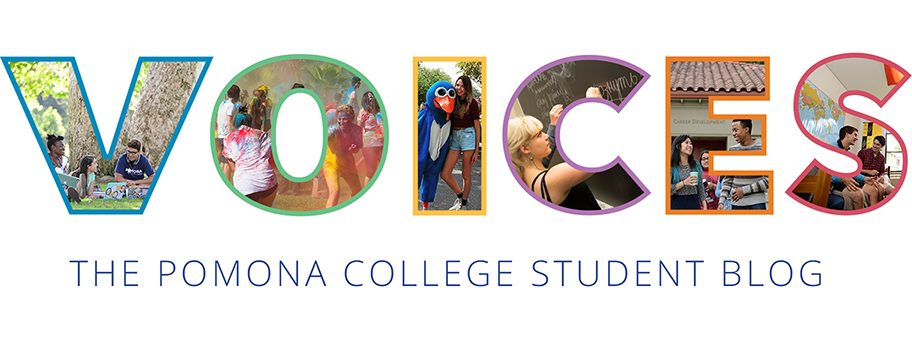By Eric Gofen ’19
Like wild animals around the watering hole, students gather in classrooms the night of the mentor session. Instead of a silent room of independent workers, the space is ripe with voices from every direction. Students sit together at tables discussing proof ideas and checking calculations. The energy is palpable. Their instinctual purpose may be finishing their problem sets, but the experience yields so much more than just answers.
 In the majority of quantitative classes at Pomona, homework assignments are problem sets. Professors encourage collaboration, and departments build in times for group learning. Often, the night before problem sets are due, the department will hold weekly mentor sessions run by undergraduate students who have completed the course. In these academic gatherings, students work collaboratively to solve the problems at hand, asking the mentor for clarification when they run into trouble. The spaces create unlikely academic connections and friendships. Believe it or not, I have met some of my best friends while doing problem sets.
In the majority of quantitative classes at Pomona, homework assignments are problem sets. Professors encourage collaboration, and departments build in times for group learning. Often, the night before problem sets are due, the department will hold weekly mentor sessions run by undergraduate students who have completed the course. In these academic gatherings, students work collaboratively to solve the problems at hand, asking the mentor for clarification when they run into trouble. The spaces create unlikely academic connections and friendships. Believe it or not, I have met some of my best friends while doing problem sets.
Not only do mentor sessions help the mentees, but they also help the mentor. I now work as a mentor for Linear Algebra—a class I took my first semester at Pomona. It’s a paid job, but I view it as play rather than work. I have the ability to help connect students who are struggling with the same problem and to see them, together, figure out the solutions. Watching them develop as mathematicians, I take satisfaction in playing my own small role in their development. It’s especially fun to watch students graduate from mentees to mentors and to observe them using the same techniques they received from their mentors.
 Similar to the mentor session, the math department’s learning communities meet at assigned times each week with a mentor. Learning communities create groups of students who feel alone in their classes and surrounds them with peers with whom they can collaboratively tackle the content and problems. For all quantitative disciplines, the Quantitative Skills Center also provides free one-on-one tutoring by students who have taken the classes before.
Similar to the mentor session, the math department’s learning communities meet at assigned times each week with a mentor. Learning communities create groups of students who feel alone in their classes and surrounds them with peers with whom they can collaboratively tackle the content and problems. For all quantitative disciplines, the Quantitative Skills Center also provides free one-on-one tutoring by students who have taken the classes before.
Pomona boasts about collaborative learning, but it is refreshing to experience it every day. It is rare that I work on my math problem sets alone (except for actually writing up my work at the end), and this is the result of systems created specifically to connect me with my peers.
Every Monday and Thursday night, I’m excited to go to Millikan 2099 and see the students file in with their new friends. I’m energized as voices fill the room and the exploration begins.
